Fantastical Librarian’s interview
As the US edition of Lawless and the House of Electricity is pushed back, here’s my tour to celebrate a year since the trilogy was out in full, here’s Fantastical Librarian‘s interview with me on the publication of the previous book, because it’s a neat introduction to Lawless.
“Doing your research again?” says my wife, glancing over my shoulder at the stream of Victorian filth.
***************************
“In 2013 I read and reviewed William Sutton’s Lawless and the Devil of Euston Square, which I liked a lot. I was looking forward to the next book, Lawless and the Flowers of Sin, but unfortunately due to the publisher closing up shop, its publication was cancelled. So when Titan Books picked up the series I was quite pleased. I’m happy to say that Lawless and the Flowers of Sin is now finally officially out in the world and I look forward to reading what is next for Campbell Lawless. I took the occasion of its publication as an opportunity to ask William some questions about his characters, his research, and his writing.”
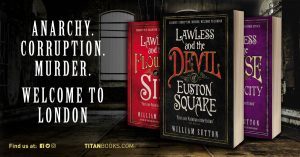
Let’s start with the basics. Who is William Sutton?
He’s a tall, messy writer with friendly demeanour, indiscriminate accent, and a tendency to sing in public.
How would you introduce people to Campbell Lawless?
Campbell Lawless is an Edinburgh native making his way in the Big Smoke of the 1860s. He’s escaped his watchmaker’s apprenticeship, seeking darker cogs and machinations to puzzle over.
He’s dogged. He’s loyal – which causes problems when he’s assisted by the Worms (gang of urchins) in the first book. Perhaps he’s too trusting, which makes him appealing and wins him friends, high and low; but he’s vulnerable to manipulation, from above and below.
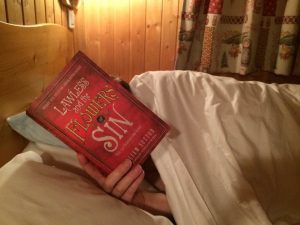
In Lawless and The Devil of Euston Square, Lawless had some of the shine and polish knocked off of him as he finds his way as a young Yard’s man. Has he more or less settled into life as a detective in The Flowers of Sin?
Lawless is suffering from the aftermath of first book: his efforts may have averted disaster, but it was all hushed up. Nobody rewards him; he has been sidelined into Scotland Yard’s backwaters.
When his Commissioner sets him the task of the police survey of the capital’s brothels and ladies of the night, he is wary, but it’s a chance for him to get into the maelstrom of life again. He soon discovers that even his jaundiced view is still wildly innocent.
While I really liked Lawless and I adored the Euston Square Worms (I hope they’ll be back!), my absolutely favourite character was Ruth Villiers. I loved her unconventional life choices and her agency. Who inspired her and will she be back?
Glad you like Miss Villiers: self-sufficient lifestyle, studying, working and outshining the detective in research acumen and code-cracking. (Some thought her anachronistic, but there were wilder women, I promise you, challenging the status quo.)
[image error]Characters are often amalgams of people you know. Ruth Villiers’ initials RV are a nod to Wilkie Collins’ wonderful heroine in The Moonstone’s Rachel Verinder. Her name amalgamates a friend and an acquaintance.
I suspect much of Ruth comes from one friend, whose briskly insightful conversation, dark hair and memorable smile are a winning combination.
Historical writing always involves lots of research. With Flowers of Sin set among the ladies of the night, houses of ill-repute and everything that comes along with being a vice detective, I can imagine the research for the book was sometimes colourful. What was the most surprising resource you came across?
Research
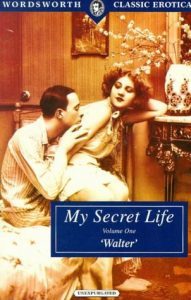
“Doing your research again?” says my wife, glancing over my shoulder at the stream of Victorian filth. Amongst the bibliography of erotica that I unearthed (via Peter Fryer’s Private Case, Public Scandal) was the epic erotic memoir Walter’s My Secret Life.
Published clandestinely at the end of the Victorian era, the mysterious Walter recounts in astonishing detail his life and loves. It’s by turns titillating and tawdry, racy and reprehensible, enlightening and enervating.
(Available to read or download free online. An archly knowing audio version in the offing.)
I don’t recommend it as a good read, as good morals, or as good pornography. But it’s an astonishing insight into what the Victorians were really like: clothes, costs, furniture, filth, exploitation, coercion, inhibitions and inequality. This is where Dorian Grey goes after dark; what Mr Hyde indulges in; where Steerforth leads Little Emily; the stuff of Dickens’ and Collins’ “beastly sybaritic jaunts”.
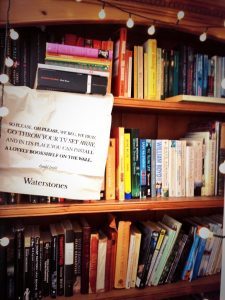
I know that The Flowers of Sin has been written for a while, as it was first slated for publication in 2014. Have you been working on more Lawless books in the interim or have you written something completely different?
What a nice question. I’m tussling with book 3 Lawless and the House of Electricity. I’ve written short stories: Lawless shorts for a French magazine; grimy fantastical tales for collections by Portsmouth writers, Portsmouth Fairy Tales, and forthcoming Dark Cities and Day of the Dead.
I’ve been hosting story performances. Musically I’ve had fun accompanying songwriters Philip Jeays and Jamie West. And I’m working on a one-man show, Songs I Cannot Sing.
What’s next for you? Any appearances or conventions planned?
Double launch of Lawless and the Flowers of Sin: 12 July Blackwell’s in Portsmouth and 14 July, a suitably revolutionary date, at Forbidden Planet, London. I’ll pop in to Harrogate Crime Festival and Bloody Scotland. Then it’s Day of the Dead in October and Valentine’s Massacre in February in Portsmouth Bookfest.
Is there something else you’re passionate about other than writing and books?
Music. I play bass, guitar and various other things, accompanying friends at open mics, occasional more serious gigs (just played at Glastonwick Festival, Petworth Fringe, and Open Ealing).
I love languages: I lived in Brazil and Italy. The show Songs I Cannot Sing will include songs in Portuguese, Italian, Spanish and more. I teach Latin and Greek, and I write songs with my classes about classical mythology.
Words.
My typewriter.
Cricket. I play with The Authors CC, who once had PG Wodehouse, JM Barrie and Arthur Conan Doyle in their line-up.
As a book reviewer, I’m all about the book enabling; I can’t help but want to make people read all the good books out there. But I can always use help. What are your top recommendations of books we should look out for in the coming months?
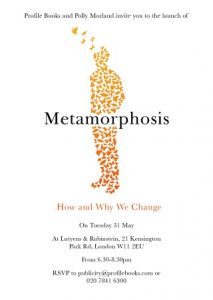
I’ve just bought Metamorphosis by Polly Morland; she writes absorbing non-fiction, built around interviews with fascinating people.
I’ll be taking Willow Walk by SJI Holliday on holiday with me to the wilds of Scotland.
I’m intrigued by Deep Down Dead by Steph Broadribb (aka Crime Thriller Girl), due out end of this year.
And I confess I’m excited to hear Johnny Marr of The Smiths is penning an autobiography, Set the Boy Free.
Finally, I have to stay true to my roots and ask a librarian question to finish off with: Do you shelve your books alphabetically, by genre or do you have an ingenious system?
Ha. I always used to go straight to the bookshelves when I visited someone’s house, to understand who they were. Now there are houses without bookshelves. Strange.
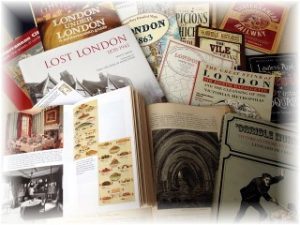
A rainbow of books
I’ve been persuaded to colour code the spines to produce a rainbow effect in the corner of our living room. Shelving thus, in descending order:
books I’ve been unwillingly lent & not yet returned
books for me to read
books for my wife to read
classics
literature
plays, short stories, myths, autobiography
Second bookcase:
good books
Scottish
Victorian Research
poetry
history, psychology
languages
music (Bob Dylan, The Smiths), cookery
By my desk:
Victorian research (current)
Victorian novels & stories
Victorian research (done)
Victorian reference
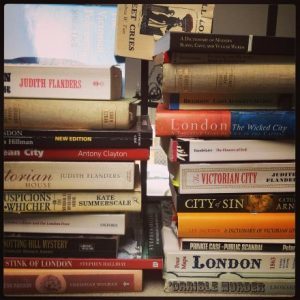
***
Bio: William Sutton comes from Dunblane, Scotland. He has written for The Times and the Fortean Times, acted in the longest play in the world, and played cricket for Brazil. His first novel is a Victorian mystery of a gleaming metropolis mired in corruption.
He writes for international magazines about language, music and futurology. His plays have been produced on radio and in London fringe theatres. He has performed at events from the Edinburgh Festival to High Down Prison, often with a ukulele. He teaches Latin and plays accordion with chansonnier Philip Jeays.
You can find William online at his website, on Twitter and Facebook.
Please Feel Free to Share:












